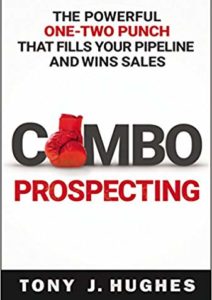I’m sorry if this offends anybody, but the weak link in the revenue chain is usually sales management.
Fact: The tone and focus in every organization is set by leadership, and culture boils down to nothing more or nothing less than the beliefs and behavior of its leaders.
Sales meetings often expose lazy or short-term mindsets and, sadly, waste most of the participant’s time.
I’ll start with a confession. In my career I’ve held Sales Manager and Director of Sales roles for public corporations. I’ve also been a Managing Director for global technology companies where I ran the Asia-Pacific region. In years past I’ve been part of the problem–so these statements aren’t just a spotlight but a mirror.
One thing we all need to recognize is that you cannot manage by results. We can only effectively manage actions and activities. You’re focused on the wrong thing if your sales meetings are dominated by the CRM projected on a big screen, and executed as accountability sessions for forecast commitments
“83% of sales management metrics do not measure sales activities” – Jason Jordan, Cracking The Sales Management Code.
Within a group setting, we need to educate, inspire and create the right focus. We need to encourage individuals to share wisdom with others. Public embarrassment in a sales meeting is actually a form of bullying.
Strong accountability is important but direct feedback should be given in weekly one-on-one sessions. But even these private sessions are not forums for Gordon Ramsay-style coaching. There is never any excuse for bullying!
In nearly every case, it’s a mistake to fire up that blowtorch and pressure your salespeople to go out and blow-up a deal through the application of clumsy pressure, or making ill-conceived discount offers with hollow threats to increase price if they don’t buy on time.
Instead, take the time to acknowledge that opening is substantially more important that closing, and than gaining an understanding of the customer’s process and timing is the route to achieving accurate forecasting.
We should always be asking the right questions of salespeople at the beginning of the quarter, and help them identify and execute the right actions that create progression. Applying insane pressure with just days to go in the quarter after neglecting the inputs that create success is a sure-fire way to damage relationships, lose salespeople, and drive-down price and margin.
In a sales meeting; by all means discuss key deals if multiple stakeholders are there and the group can contribute or learn. Here are some important principles for making sales meetings an effective use of everyone’s time:
- Motivate and inspire by celebrating success with individuals and recognize those who are over-achieving in their KPIs that ultimately create revenue. Highlight corporate wins and new customers. Always emphasize team effort along with the commitment of key individuals.
- Ensure that your marketing team is part of sales meetings and that you drive sales and marketing alignment and collaboration. This is a critical success factor for strategic social selling where salespeople are content amplifiers and potential content creators. Salespeople can learn from marketing to improve their messaging and branding on platforms such as LinkedIn.
- Collaboratively share market intelligence concerning competitor activity and tactics. Insights from both loss reviews and win review insights should be shared including trigger events that created interest with prospects early and then workshop how to create the most powerful conversations.
- Foster information sharing and train a skill or technique that can help people improve results. This includes buyer ‘trigger event’ identification, referral techniques, customer case studies, etc.
- Invite a guest to speak or present briefly to create better understanding of other parts of the business or how to best engage with partners.
The key point in all of this is that sales meetings should inspire, educate and equip sales people to execute better with customers. Sales meetings should foster collaboration and serve the sales team, not just the sales manager.
Wasting everyone’s time going through individual deals may help the manager avoid 1:1 sessions with sales people but it’s not best practice. If you run forecast updates then call the meetings exactly that. Preserve the title of ‘sales meeting’ for sessions that salespeople want to attend and that provide value for all in attendance.
Pipeliner CRM empowers sales managers to precisely run sales meetings. Get your free trial of Pipeliner CRM now.


![How [Not] to Run a Sales Meeting](https://salespop.net/wp-content/uploads/2018/01/690-860x350.jpg)



![How [Not] to Run a Sales Meeting](https://salespop.net/wp-content/uploads/2025/11/Untitled-design-77-68x68.png)
![How [Not] to Run a Sales Meeting](https://salespop.net/wp-content/uploads/2026/01/Email-Marketing-Expert-Reveals-Cold-Outreach-Secrets-Adam-Rosen-68x68.png)
![How [Not] to Run a Sales Meeting](https://salespop.net/wp-content/uploads/2025/11/Surrender-to-Lead-Why-Letting-Go-Drives-Better-Sales-Joe-Terry-68x68.png)
![How [Not] to Run a Sales Meeting](https://salespop.net/wp-content/uploads/2025/12/Stop-Closing-Start-Connecting-3-Shifts-for-Modern-Sales-Leaders-Whitney-Faires-68x68.png)
![How [Not] to Run a Sales Meeting](https://salespop.net/wp-content/uploads/2025/12/Balance-Closing-Business-and-Opening-New-Doors-for-Growth-68x68.png)
![How [Not] to Run a Sales Meeting](https://salespop.net/wp-content/uploads/2025/12/How-to-Build-a-High-Performance-Scalable-B2B-Recruitment-Funnel-Kevin-Downey-68x68.png)
![How [Not] to Run a Sales Meeting](https://salespop.net/wp-content/uploads/2025/12/Plant-Ideas-and-Sow-the-Seeds-for-New-Business-Growth-68x68.png)
Comments